In this article:
You can try some simple yet effective home remedies to help reduce gum recession, fight periodontal diseases and improve your overall oral health. But bear in mind that none of these remedies alone is going to fix periodontal disease and the associated gum recession.

They mostly aim to relieve gingivitis (gum inflammation) or be used as an adjunct measure by someone who has had their periodontal disease treated professionally and is now looking to maintain their gum health and prevent future problems.
Natural Remedies for Receding Gums
Here are 10 home remedies for receding gums.
1. Try oil pulling technique
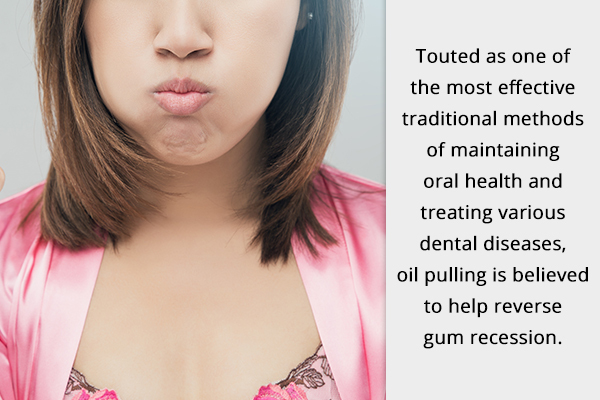
Touted as one of the most effective traditional methods of maintaining oral health and treating various dental diseases, oil pulling is believed to also help reverse gum recession.
A study published in the Journal of Ayurveda and Integrative Medicine reports that oil pulling is highly beneficial for oral health. (1)
To practice oil pulling, always use coconut oil. It works particularly well in forming a protective coating on the teeth, thereby preventing plaque buildup. Coconut oil also takes care of any kind of dental and gum infections.
How to perform:
- Swirl and swish 1 tablespoon of virgin coconut oil in your mouth for 15 to 20 minutes.
- Spit out the oil (it should have turned thick and milky).
- Rinse your mouth with water. Then brush your teeth as usual.
- Repeat the process daily in the morning on an empty stomach for about 1 month.
You can do oil pulling on a regular basis also to help detoxify your body and keep it healthy.
Caution: Do not gargle or swallow the oil.
2. Rinse your mouth with bee propolis
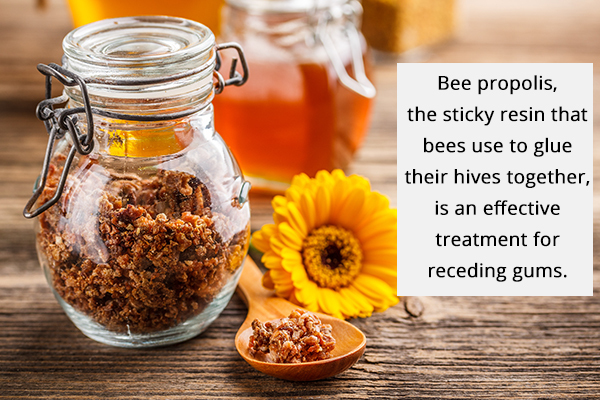
Bee propolis, the sticky resin that bees use to glue their hives together, is another effective treatment for receding gums. It is rich in antibiotic and antifungal properties that help get rid of bacteria that can cause a number of dental issues.
A 2013 study published in Evidence-Based Complementary and Alternative Medicine reports that propolis-based preparations have a wide range of applications in various specialties of dentistry due to its rich natural components. (2)
A 2014 study published in the Journal of Alternative and Complementary Medicine reports that the use of a 2% typified propolis rinse was considerably effective in maintaining adequate oral hygiene. (3)
How to use:
- Rinse your mouth twice daily with a propolis mouth rinse that you can easily find in your local market or grocery store.
- You can opt to take propolis capsules or tablets. Always consult your doctor before taking supplements.
Caution: Anyone allergic to bee stings should not use bee propolis.
3. Mouthwash with baking soda solution
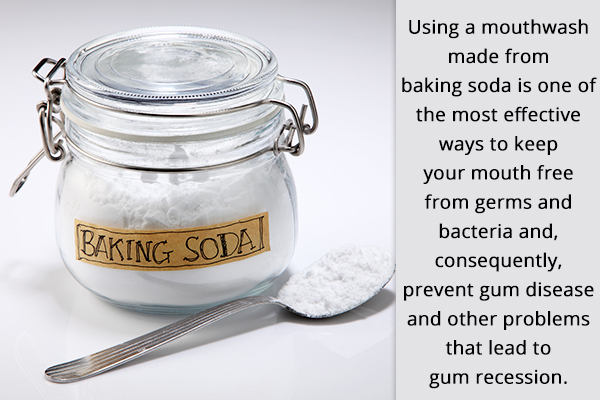
Using a mouthwash made from baking soda is one of the most effective ways to keep your mouth free from germs and bacteria and, consequently, prevent gum disease and other problems that lead to gum recession.
Baking soda, or sodium bicarbonate, works as a mechanical cleanser of the teeth and gums. It neutralizes acid production in the mouth and also works as an antiseptic to prevent infections.
A 2017 study published in the Journal of the American Dental Association attributes the beneficial effect of baking soda in promoting gingival health to its antibacterial and biofilm-disruptive activity. (4)
How to use:
- Pour 1 cup of water into a glass or jar.
- Add 1 teaspoon of baking soda.
- Add 4 drops of pure peppermint oil.
- Add 4 drops of tea tree oil.
- Mix the ingredients well.
- Use this solution as a mouthwash twice daily for a few weeks.
4. Massage your gums with aloe vera gel
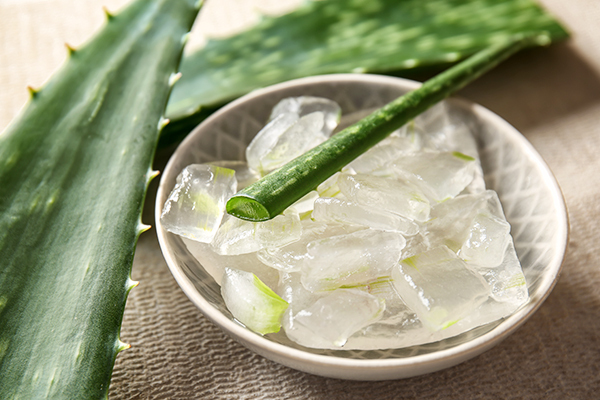
Aloe vera helps fight gum inflammation and repair damaged tissue. Thus, it is a good remedy for gum recession. (5) It also has antibacterial properties that ward off oral infections and plaque buildup.
In a 2011 study published in the Journal of Indian Society of Periodontology, the administration of aloe vera gel resulted in a significant improvement in periodontal condition and can be used as a local drug delivery system in periodontal pockets. (6)
How to use:
- Massage your gums with fresh aloe vera gel. Leave it on for at least 30 minutes before rinsing it off. Repeat this twice a day.
- Alternatively, swish some aloe vera juice in your mouth a few times and then spit it out. Do this twice daily.
5. Relieve pain with turmeric paste
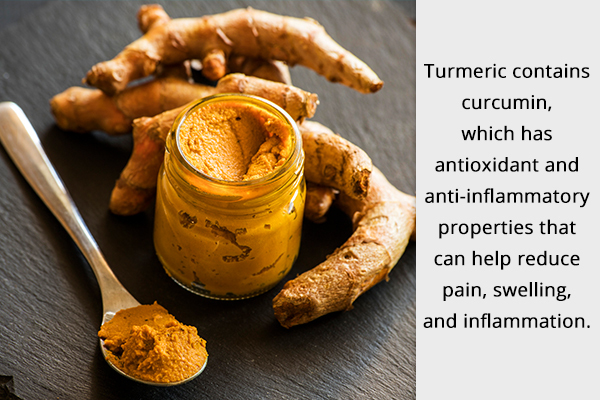
Turmeric is also very effective in controlling gum recession.
Turmeric contains curcumin, which has antioxidant and anti-inflammatory properties that can help reduce pain, swelling, and inflammation. Also, it prevents the spread of bacterial activity that causes several oral problems. (7)
A 2012 study published in the Journal of Indian Society of Periodontology found turmeric mouthwash to be effective in controlling plaque. (8)
- Mix ¼ teaspoon of turmeric powder with a little water to make a paste. Apply this paste on your gums with a clean finger. Leave it on for 5 minutes, and then massage your gums gently for 1 minute. Rinse your mouth with warm water. Repeat this twice daily.
- You can also boil a ½ teaspoon of turmeric powder in 1 cup of water. Allow it to cool and use it as a mouthwash once daily.
6. Drink green tea
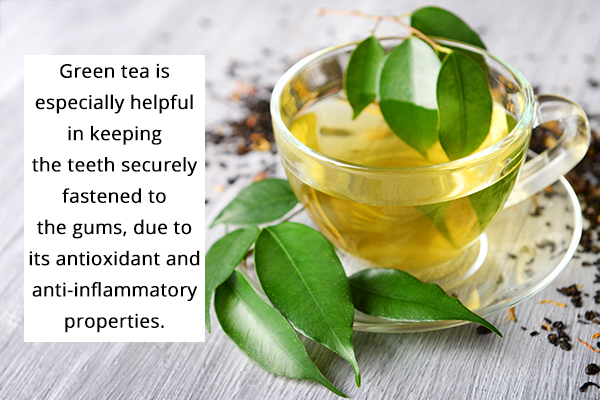
Green tea is another home remedy that you must try for gum recession. It is especially helpful in keeping the teeth securely fastened to the gums, due to its antioxidant and anti-inflammatory properties.
It not only reduces the chance of developing the periodontal disease but also brings down gum inflammation and improves the attachment of gums to the teeth.
A 2017 study published in the Journal of International Oral Health confirmed the antioxidant, antimicrobial, and anti-collagenase activities of green tea that help preserve and protect periodontal health. (9)
A 2012 study published in the Journal of Indian Society of Periodontology suggests that green tea promotes periodontal health by reducing inflammation, preventing bone resorption, and limiting the growth of certain bacteria associated with periodontal diseases. (10)
How to use:
- Drink 1 to 2 cups of green tea daily. To promote oral health, drink it without sugar or honey.
- You can also chew sugarless gum made with green tea.
7. Rinse with hydrogen peroxide solution
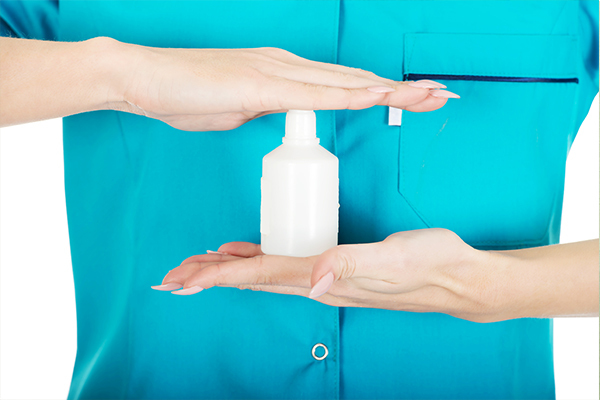
Hydrogen peroxide is an amazing natural remedy for receding gums as well as other gum diseases. (11) It works as a strong antibacterial agent that kills germs and fights gum disease. It will also leave your teeth whiter when used regularly.
For oral health, it is highly recommended to use 3% hydrogen peroxide, which makes for an effective mouthwash.
- Mix equal parts of 3% hydrogen peroxide and water. Rinse your mouth with the solution for a few seconds, and then spit it out. Use it a few times a week.
- Alternatively, mix 3% hydrogen peroxide little by little into 1 teaspoon of baking soda to make a paste. Use this paste to massage your gums and gum line. Finally, spit it out and rinse your mouth. Use it a few times a week.
Caution: Do not use hydrogen peroxide too often. Once a day is sufficient. Also, do not swallow it.
8. Munch on Indian gooseberry
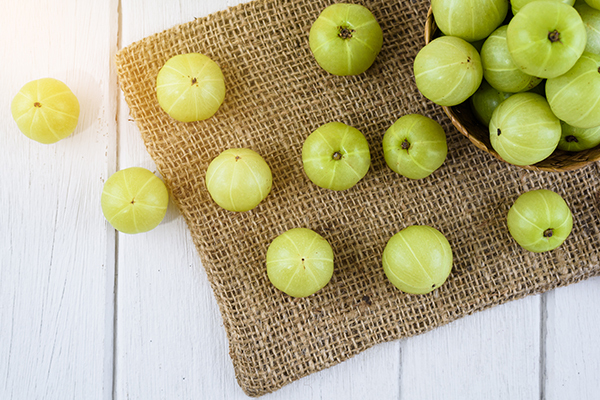
Indian gooseberry, also known as amla, can also help rectify receding gums and promote oral health.
The vitamin C and other nutrients in amla help strengthen the gums and support connective tissue health. It combats bacteria in the mouth to prevent tooth decay and cavities and helps prevent bad breath.
A 2014 study published in Pharmacognosy Reviews reports that amla is considered a general rebuilder of oral health in Ayurveda. (12)
How to use:
- Thoroughly chew 1 to 2 fresh amla fruits daily.
- Also, you can prepare a mouth rinse by mixing 1 tablespoon of amla juice in a ½ cup of water. Rinse your mouth with this solution once daily.
9. Brush your teeth with Indian lilac paste
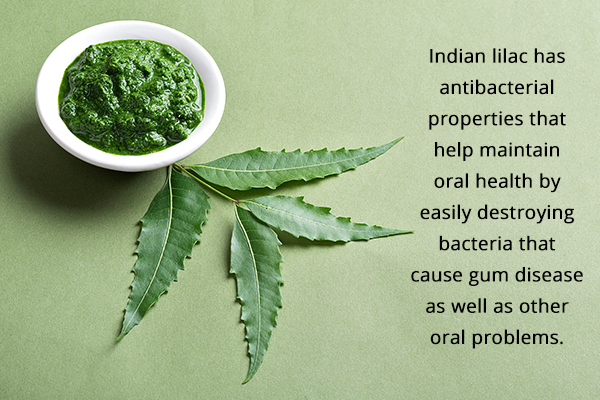
Whether you wish to improve the health of your teeth or gums, Indian lilac, also known as neem, can be very effective. It has antibacterial properties that help maintain oral health by easily destroying bacteria that cause gum disease as well as other oral problems.
In this regard, a 2011 study published in the Journal of Indian Society of Periodontology found neem to be effective for the treatment of plaque. (13)
How to use:
- Grind a few neem leaves into a paste. Use this paste to brush your gums and your teeth a few times a week.
- You can also rub the juice from neem leaves on your teeth and gums. Allow it to sit for 5 minutes, and then rinse it off with warm water. Do this once daily.
10. Up your vitamin C intake
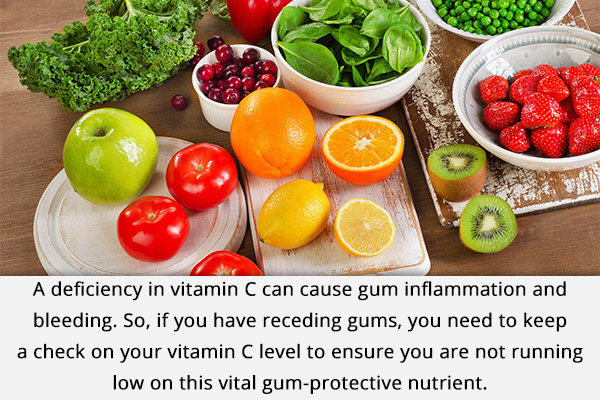
A deficiency in vitamin C can cause gum inflammation and bleeding. So, if you have receding gums, you need to keep a check on your vitamin C level to ensure you are not running low on this vital gum-protective nutrient. (14)(15)
Vitamin C is essential for collagen production, the protein “glue” that holds cells together. Vitamin C also helps kill bacteria and works as an anti-inflammatory and healing nutrient.
Moreover, it helps remove plaque and tartar buildup from teeth and gums.
- To get vitamin C, eat fresh vegetables and fruits that are rich in vitamin C, especially dark leafy greens, bell peppers, broccoli, tomatoes, kiwis, berries, and citrus fruits.
- If you are not getting enough vitamin C in your diet, consider taking a good supplement. Always consult your doctor before taking a supplement.
- You can also use calcium ascorbate, a form of vitamin C available as a powder. Rub this powder on your gums and teeth for a few minutes daily.
How to Prevent Receding Gums?
A healthy lifestyle, timely medical care, and a well-balanced diet are just as important for preserving your gum health as they are for your overall well-being. Moreover, certain preventive measures can also help minimize the risk of the problem of receding gums:
- Refrain from flossing too rigorously and in a way that it cuts into your gums.
- Use a soft-bristled brush to clean your teeth twice daily, for at least 2 minutes at a time. Be as gentle as you can when brushing your teeth. Let the bristles do the work, not your arm muscles.
- People who are active smokers or tobacco consumers should do their gums a favor by quitting such nasty habits.
- If you are in the habit of unwittingly grinding your teeth at night, speak to your dentist about prescribing a suitable mouth guard for your condition.
- To rinse your mouth, do not use tap water. Instead, use filtered, bottled, distilled, or mineral water.
- Replace your toothbrush every three months and use only soft-bristled toothbrushes.
- Avoid very hot or very cold food and beverages.
- Drink plenty of water throughout the day to stimulate the production of saliva, which naturally helps kill bacteria.
- Eat calcium-rich foods, such as dairy products, sardines, tofu, salmon, soy milk, cereals, and collard greens.
- If you often have swollen gums, increase your intake of vitamin D to relieve the problem.
- Avoid wearing body-piercing studs on the lip or tongue, as it can rub against the gum tissue, causing a recession.
- See your dentist twice per year, even if you take great care of your teeth and gums.
Final Word
Regular dental checkup by a professional is perhaps the most important prerequisite for safeguarding your oral health and preventing issues such as gum recession.
As the wear and tear of gingival tissue is a slow, gradual process that becomes detectable over time, your dentist is well equipped with the necessary dental tools and knowledge to alert you to any signs of trouble. To that end, your dentist can monitor your gumline across multiple visits for signs of any recession over time.
If he/she notices any signs of periodontitis or bacterial buildup, the dentist may recommend deep cleaning procedures that include root planing and scaling to scrape off the gunk and mitigate the growth of bacteria and the subsequent gum recession.
As far as gumline is considered, there are no set standards for determining what qualifies as normal gingival coverage, particularly in terms of how high your gum should appear on your tooth. Most people do not accord much attention to their gum height and remain blissfully aloof even when their gums start to pull back.
In order to catch this problem early, it is therefore imperative to familiarize yourself with your gumline by periodically checking it out in the mirror. Only when you know the normal appearance of your gums and teeth beforehand would you be able to notice any signs of gingival tissue loss if it does occur.

- Was this article helpful?
- YES, THANKS!NOT REALLY


